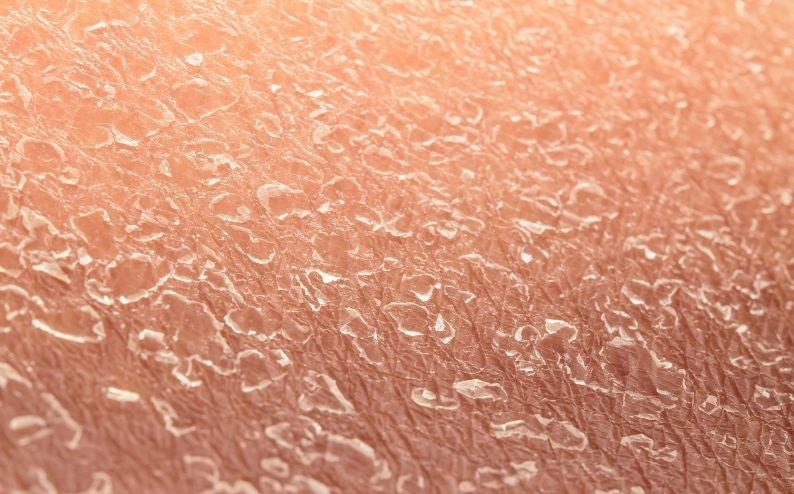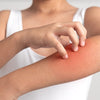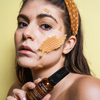DRY SKIN: What causes it and how to prevent it

Dry skin is a condition in which the skin loses its natural moisture. It can feel tight, rough, and often flaky and itchy. Dry skin is often caused by the loss of natural oils and lipids that make up a healthy skin barrier. Adequate hydration, the use of moisturizers, and proper skin care are key to managing and preventing dry skin.
WHAT IS DRY SKIN AND WHAT TYPES DO WE KNOW?
Dry skin is a skin condition that occurs due to low moisture content and loss of natural lipids from the skin. The skin becomes rough, cracked and flaky. Dry skin can be very uncomfortable and can cause itching, burning and irritation, so it is important to take care of it.
There are several different types of dry skin, each of which can cause different symptoms. Some common types of dry skin include:
- XEROSIS: This is a condition of extremely dry and flaky skin caused by a lack of moisture in the skin. It is often caused by external factors such as cold, wind, low humidity, frequent showers or the use of harsh cleansers. Dry skin usually appears on exposed areas of the body such as the hands, feet, elbows and knees.
- CONSTITUTIONALLY DRY SKIN OR CONSTITUTIONAL ECZEMA : A weakened skin barrier function is common for dry skin. It is often linked to genetics and is present from birth. The skin is usually thin, flaky and prone to moisture loss.
- CONTACT DERMATITIS: Dry skin occurs when the skin comes into contact with something that triggers an irritation or allergic reaction. It appears as dry, itchy skin with redness. Examples of irritants include jewelry materials, cosmetics, detergents, or certain medications.
- ATOPIC DERMATITIS OR ATOPIC ECZEMA: This is a chronic inflammatory skin condition that manifests as itchy, irritated, and dry skin. It often occurs in people with a tendency to allergies and asthma.
- SEBOROIC DERMATITIS: Dry skin often appears in areas where the sebaceous glands are more active, such as the scalp, face, ears, and chest. In addition to dry skin, white-yellow scales and itching may appear.
- DRY SKIN WITH AGEING: As we age, the skin's moisture content and natural lipid layer decrease, leading to dryness, increased sensitivity, and moisture loss. Dry skin often appears on the face, neck, and hands.
It is important to note that the causes and symptoms of dry skin vary from person to person. If you are experiencing dry skin, it is always advisable to seek the advice of a dermatologist to determine the specific cause and initiate appropriate treatment.

COMMON CAUSES OF DRY SKIN AND HOW TO RECOGNIZE THEM
Dry skin can be caused by a number of factors that affect the moisture content of the skin. Read on to learn about the most common causes of dry skin and how to identify them.
- Lack of moisture in the air
Skin becomes dry when the air in the environment is dry. This usually happens during the winter months due to indoor heating. Dry skin is characterized by a loss of elasticity and softness, and can also cause rough skin and itching.
- Excessive use of soap or shower gel
Soap can strip away the natural lipids that make up a healthy skin barrier. Excessive use of harsh soaps and shower gels can cause dry skin, which can manifest as redness, loss of elasticity, and itching.
- Frequent bathing or showering
Frequent bathing or showering can strip the skin of its natural oils and dry it out. This problem is often caused by using water that is too hot and taking too long to shower or bathe. Symptoms caused by frequent bathing or showering include peeling skin, rough, cracked and dry skin.
- Dehydration
The cause of dry skin can be dehydration. If we do not drink enough water during the day, dry skin can occur. It becomes cracked and loses elasticity, and the skin can peel.
- Genetic factors
Some people have a genetic predisposition to dry skin, which manifests itself in less elastic, cracked, and rough skin.
- Aging
As we age, the moisture content of the skin decreases. The percentage of collagen in the skin also decreases, making the skin less elastic over the years. Dry skin in older people is manifested by fine lines, a scaly appearance, and itching.
If you notice symptoms of dry skin, it is important to identify the cause and take steps to improve skin moisture. With regular skin care, using appropriate products, and adjusting your lifestyle, you can improve the condition of dry skin.

EFFECTIVE METHODS TO PREVENT DRY SKIN
Dry skin can cause discomfort and an unhealthy appearance. In this part of the article, check out some effective methods that can help you prevent dry skin and keep it moisturized and smooth.
- Reducing the shower water temperature
Hot water strips the skin of its natural oils, which can lead to dry skin. It is therefore recommended to use warm water instead of hot water when bathing or showering. It is also recommended to reduce the time you spend bathing or showering to avoid over-drying your skin.
- Avoiding harsh skin cleansing products
Overly aggressive shower gels or soaps can dry out the skin. Therefore, it is recommended to use gentler skin cleansing products with ingredients that help maintain the skin's natural moisture.
You can buy a gentle, natural shower gel that is suitable for dry skin care HERE .
- Using moisturizing creams and ointments
Moisturizers and ointments help maintain the skin's natural moisture and prevent it from drying out. Moisturizers should be used regularly, especially after bathing or showering, when the skin is more susceptible to moisture loss.
Try a nourishing ointment that locks moisture into your skin with the power of natural ingredients HERE .
- Using humidifiers
Using a humidifier can help keep the air moist, which can help reduce the chance of dry skin. You can buy humidifiers at home improvement stores, or you can use a water sprayer or simply place a bowl of water on a radiator.
- Drinking enough water
Drinking enough water is important because water helps keep your body hydrated. Skin that is adequately hydrated from within is less prone to dryness.
- Dietary adjustment
Certain foods can help keep your skin hydrated. Foods rich in omega-3 fatty acids, such as salmon, walnuts, and flaxseed, can help keep your skin hydrated. It's also important to eat plenty of fruits and vegetables, which contain vitamins and minerals that help keep your skin healthy.
Following these methods in your daily routine helps prevent dry skin and keep your skin healthy and moisturized.

HOW TO CARE FOR DRY SKIN AND RESTORE ITS NATURAL LIPID LAYER
Dry skin needs special care and hydration to restore its natural lipid layer and prevent further drying. Here are some methods that will help you care for dry skin and restore its lipid layer.
- Using gentle skin cleansing products
When cleansing your skin, it is important to use gentle products that will not dry out your skin. It is recommended to use products that are alcohol-free and fragrance-free. A gentle cleanser will help remove dirt and oil without damaging the skin barrier.
- Using body lotions
Using body lotions is essential for body care where dry skin is present. Lotions help restore the skin's natural lipid layer, which retains moisture in the skin. It is recommended to use them twice a day, morning and evening, or as needed.
- Using a nourishing body lotion
Using a nourishing body lotion adds moisture to the skin and creates a protective layer that prevents dry skin from appearing. It soothes and nourishes cracked skin, has an anti-inflammatory effect, and helps regenerate skin cells.
- Adding oils to the bath
Adding a few drops of oil to your bath can help restore your skin's natural lipid layer. Oils like olive oil, almond oil, or jojoba oil can help restore moisture to your skin.
- Using a face mask
Dry skin on your face? Use a face mask. Face masks that contain moisturizing ingredients like honey, hyaluronic acid, and glycerin can help increase the moisture content of your skin.
By incorporating the above methods into your skin care routine, you will ensure a healthy skin barrier and soft, smooth skin.

NUTRITION AND LIFESTYLE TO PREVENT DRY SKIN
Diet and lifestyle can play an important role in preventing dry skin. Below are some tips for a healthy diet and lifestyle that can help prevent dry skin from occurring.
- Eating enough fat
Fats are an important part of a healthy diet, as they help to retain moisture in the skin. It is recommended to consume healthy fats, such as omega-3 fatty acids, which are found in fish, nuts and seeds.
- Consuming sufficient amounts of vitamins and minerals
Vitamins and minerals are essential for healthy skin. It is recommended to eat foods rich in vitamins A, C and E, which can help repair and protect the skin. In addition, minerals such as zinc, iron and selenium are also important.
- Limiting alcohol and caffeine
Alcohol and caffeine can dehydrate the body and reduce the moisture content of the skin, which can result in dry skin. It is recommended to limit alcohol and caffeine consumption and replace them with water and other healthy beverages.
- Stress reduction
Stress can worsen skin conditions. It is recommended to practice relaxation methods such as yoga, meditation or breathing exercises, which can help reduce stress and improve overall health.
- Avoiding smoking
Smoking can cause dry skin. It is recommended to avoid smoking and exposure to other forms of tobacco smoke.
- Regular exercise
Regular exercise can improve circulation and help maintain healthy skin. At least 30 minutes of exercise each day, such as walking, running, or cycling, is recommended.
- Get enough sleep
Sleep is key to skin renewal. It is recommended to get at least 7-8 hours of sleep each night so that the skin can repair and regenerate.
Dietary and lifestyle changes can help prevent dry skin and improve overall health.

EFFECTIVE INGREDIENTS IN COSMETIC PRODUCTS TO FIGHT DRY SKIN
When choosing cosmetic products to combat dry skin, it is helpful to look for products that contain the following ingredients:
- Honey: Honey is a natural humectant that helps retain moisture in the skin and nourishes it. It also has antioxidant and anti-inflammatory properties that help soothe dry, itchy skin and promote skin renewal.
- Niacinamide: Also known as vitamin B3, niacinamide is an ingredient that helps strengthen the skin barrier and reduce moisture loss. It also has anti-inflammatory properties that soothe dry and irritated skin, giving it a healthy, radiant appearance.
- Allantoin: Allantoin is an ingredient that soothes and moisturizes dry skin. It also has mild exfoliating properties that help remove dead skin cells and promote skin regeneration and renewal.
- Panthenol: Panthenol, also known as provitamin B5, acts as an effective moisturizer for dry skin. It penetrates deep into the skin, where it locks in moisture, accelerates cell renewal, and improves skin elasticity.
- Cocoa Butter: Cocoa butter is rich in fatty acids that help retain moisture in the skin and soften dry skin. It also has antioxidant properties that help protect the skin from free radicals and maintain its elasticity.
- Shea Butter: Shea butter is an incredibly nourishing ingredient that protects the skin from moisture loss and repairs dry skin. It is rich in vitamins A and E and fatty acids that help retain moisture in the skin and restore its softness and suppleness.
- Glycerol: Glycerol is a humectant that improves skin hydration and helps it retain moisture. It also helps soften dry skin.
- Natural oils: Natural oils like sunflower oil, jojoba oil, and coconut oil are rich in fatty acids, vitamins, and antioxidants. These oils help nourish dry skin and restore its natural lipid barrier.
When choosing cosmetics to combat dry skin, it is important to choose products that are suitable for your skin type and do not contain aggressive ingredients. It is recommended to check the list of ingredients on the cosmetic product packaging and look for products that contain effective ingredients.

WHAT TO DO WHEN DRY SKIN TURNED INTO DERMATITIS OR ECZEMA
If dry skin turns into dermatitis or eczema, it's important to see a dermatologist. This is especially important if the condition worsens or if other symptoms appear on the skin, such as itching, redness, blisters, or flaking.
Dermatitis and eczema are skin conditions that can cause severe symptoms such as itching, inflammation, cracking of the skin, and bleeding. Treatment usually begins with the use of topical creams and ointments containing corticosteroids or other anti-inflammatory ingredients. Sometimes, systemic medications or phototherapy are also needed.
In addition to medications, avoiding irritants that can make your dermatitis or eczema worse can also help. These include cosmetics, perfumes, cleaning products, household chemicals, and certain foods. If you know what triggers your problems, avoid these substances or use them in very limited amounts.
Sometimes, lifestyle changes, including improving your diet, avoiding stress, and getting enough sleep, can help treat dermatitis or eczema. It's also important to avoid excessive sun exposure and use sunscreen, as the sun's rays can worsen the condition of your skin.
In general, when it comes to dermatitis or eczema, it is important to consult a specialist and follow their instructions regarding treatment and skin care.

WHY IS MY SKIN DRY DESPITE USING LOTION?
There are several possible reasons why your skin is dry despite skin care with creams and lotions. The reason could be:
- The skin care product you are using contains irritating and drying ingredients, such as alcohol or sulfates.
- You are cleansing your skin too often or using too aggressive cleansing agents.
- You use too hot water when showering or bathing.
- You don't use skin care products often enough.
- The skin care product you are using is not right for you. It may only contain moisturizing ingredients, which can evaporate quickly from the skin. Try using a product that also contains ingredients that protect the skin from moisture loss.
- The skincare product you are using has expired.
- The reason for dry skin lies in a disease that needs to be treated.
If dry skin does not go away despite following the tips for preventing dry skin, consult a doctor or dermatologist.

SUMMARY
Dry skin is a common problem that many people face, but there are many effective methods to combat it. By using cosmetic products that contain beneficial ingredients such as niacinamide, honey, allantoin, panthenol and others, we can improve the hydration of the skin, restore its natural lipid layer and restore its softness and elasticity. In addition, it is important to maintain a healthy lifestyle, including a healthy diet and sufficient hydration. With proper care and the use of effective ingredients, we can achieve healthy, moisturized skin and get rid of the unpleasant symptoms of dry skin.




